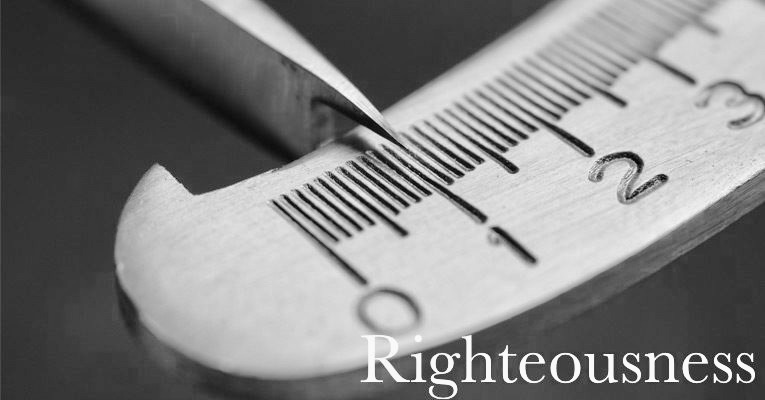Throughout Proverbs, Solomon assumes the reality of the righteous and the wicked. The righteous are those who are in the way of wisdom and the wicked are in the way of folly. They are antithetical to one another in their hearts’ thoughts and affections (12.5), the way they speak (12.6), how they treat their animals (12.10), the way they do business (16.11), and their confidence before real or perceived accusers (28.1). Each finds the other odious (29.27). The righteous and the wicked live together in this world.
Wait. Is that really possible? Are there really righteous people in the world?
In the Protestant world, we have been trained to think of the impossibility of us being righteous. One aspect of the Reformation was the recovery of the truth that we had no righteousness of our own and needed Christ’s righteousness. “There is none righteous, no not one” (Rom 3.10; Psa 14.3). This is true. But if we don’t understand how the Bible uses the term “righteous,” we can be confused or dismiss the possibility of living righteously.
Some will say that all these passages that talk about us being righteous point to Jesus as the only fulfillment of what it means to be righteous. They only apply to him but not to us. This won’t do. Jesus is the fulfillment of all righteousness, but it is not as if we don’t have the command and, with it, the possibility of living righteously.
Let’s begin with the basics. Righteousness assumes a standard. What is the standard? God himself. He is Righteousness. If we put our post-fall character up against his character, we don’t meet the standard. We are sinners. But the measurement is not an impersonal measurement of purity standards between inanimate objects. We must keep these measurements within the relationship God has revealed.
God relates to us by way of covenant. A covenant is a formal relationship that obligates all parties to certain standards, promising blessing for those who are faithful to it and curse for those who are unfaithful to it. God initiates and institutes this relationship with his creation in general and with man in particular. He binds himself to us with certain obligations (promises) and demands faithfulness—loyalty–from us. The covenant is the standard by which righteousness and wickedness are measured.
Righteousness and wickedness are not the same things as being sinless and a sinner respectively. There are people whom God calls righteous, who walk in all the commandments and statutes of the Lord. Zechariah and Elizabeth, the parents of John the Baptizer, were such people (Lk 1.6). Noah, Daniel, and Job were also righteous (Ezek 14.14, 20).
How can this be? God’s covenant makes provision for and promises the forgiveness of sins. When you trust God’s provision, confessing and repenting of your sins, then you are righteous. You are loyal to all that God commands.
This is the basis of the prayers in the Psalms, for example, that call upon God to “judge me according to my righteousness” (cf. e.g., Ps 7). David, and the church that prays these Psalms with him, are asking God to judge us based on our loyalty to his covenant.
“But what about Paul quoting the Psalm that says, ‘There is none righteous, no not one’? (Rom 3.10; Pss 14.3; 53.1) What does this mean for my gospel presentation of the Roman Road to Salvation?” It may need to be adjusted. Paul’s purpose in quoting these Psalms is to join in with David to distinguish between who is righteous and who is wicked and, therefore, who deserves vindication and who deserves condemnation.
Psalm 14 deals with “the fool,” a principal character in Proverbs. He says, “No, God!” He is defiant against God. The Psalm is directed toward those who have rejected God’s revelation and turned to oppress God’s people. David is not saying that everyone, head-for-head, is unrighteous. He considers himself righteous and stands with the rest of the righteous against these fools. The unrighteous are the ones who are eating up God’s people as they eat bread (Ps 14.4). David is assured that the generation of the righteous will be delivered (Ps 14.5, 6). Paul is placing the Jews who stand in opposition to Yahweh now revealed in Christ Jesus into the category of the fool in Psalm 14. The Jews represented by their leadership are the fools that said “No, God!” They rejected God’s covenant with its provision, promises, and way of life.
Those who are righteous are the opposite: we proclaim our loyalty to God’s covenant by accepting God’s provision and conforming our lives to all of his commandments. Our righteousness is in Christ Jesus. He is our provision for sin and the one to whom we conform our lives. He is our Savior—the one who delivers us from sin–and our Lord–the authority who sets the boundaries for our lives. Righteousness and wickedness are now determined by how you live in relationship with Christ Jesus. If you are loyal to Christ Jesus, pledging your full allegiance to him, then you are righteous. If you are a rebel against his lordship, then you are wicked.
The way of wisdom is the way of righteousness. The way of righteousness is the way of life.
*Picture taken from calibrate.co.uk
















